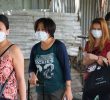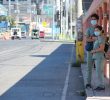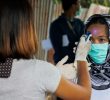DAVAO CITY – With the private sector given the green light by the national government to purchase COVID-19 vaccines, a public health expert advised these companies from imposing charges from their employees as this violates the people’s right to health.
President Rodrigo Duterte approved on February 26 the COVID-19 Vaccination Program Act of 2021 which allows private entities to procure vaccines through tripartite agreements with the national government and vaccine manufacturers.
Several banks, schools, media outfits and others across the country including Davao City have already negotiated with vaccine companies and some have already purchased and await their orders.
The Department of Labor and Employment (DOLE) has issued guidelines that prohibit the private sector from “directly or indirectly” charging employees for the vaccines. But some firms have reportedly said charges will be made.
Ateneo de Davao University (AdDU) has committed to free vaccination only for its faculty members and scholars. Family members of employees and part-time employees are allowed to sign up for vaccination but will be charged “possibly through salary deduction,” said AdDU President Fr. Joel Tabora, SJ in a story quoted by the campus publication Atenews.
Davao Today tried to reach out to the AdDU administration but did not receive any response as of posting time.
The Davao City Government has given notice of such reports, and has released a notice on April 23 prohibiting private companies from making vaccination mandatory for employment and continued employment in the workplace, as well as enrollment in schools.
It also said that requiring employees or students to pay charges relating to vaccination is “highly questionable” and said it has raised the issue to the Department of Health for clarification.
Doctor Josh San Pedro, convener of the Coalition for People’s Right to Health, told Davao Today that “…(t)he private sector must keep in mind that it should be vaccinating their employees for free, without extra or hidden charges, as mentioned by the DOLE circular and the directives of the IATF, and in keeping with the right to health.”
San Pedro added that the practice of some firms asking for additional payments “go against the right to health and may further inequities in the population.”
But San Pedro said that this situation is “borne from the perception that the public sector is unable to perform the massive task of COVID-19 vaccination on its own.”
Government data shows that the country has fully vaccinated 289,541 persons as of May 2 after vaccine rollout started in March, which is 0.41% of the government’s target to give COVID-19 immunization to 70 million Filipinos.
COVID-19 vaccines









